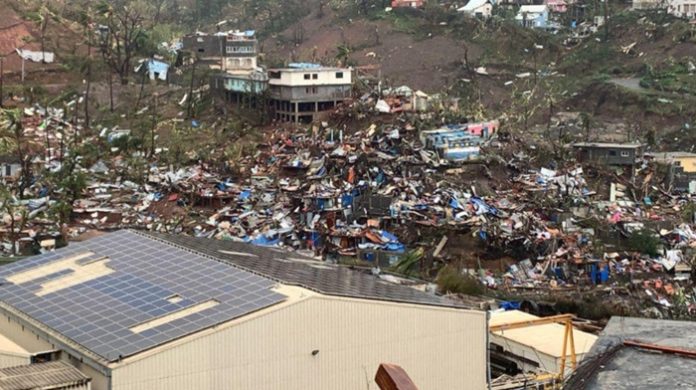The death toll from Cyclone Chido in France’s Mayotte region is in the “hundreds” and could rise into the thousands, the island’s top government official told a local broadcaster on Sunday.
France rushed rescue teams and supplies to the heavily impoverished Foreign Department in the devastated Indian Ocean.
The French Interior Ministry confirmed at least 11 deaths and more than 250 injuries earlier Sunday, but said the number was expected to rise significantly.
Mayotte, located in the southwestern Indian Ocean off the coast of Africa, is the poorest island in France and the poorest in the European Union. It has a population of just over 300,000 spread over two main islands.
Chido swept across the southwestern Indian Ocean on Friday and Saturday, affecting the nearby islands of Comoros and Madagascar. However, Mayotte rode directly into the storm, taking the brunt of it. Chido brought winds of more than 220 kilometers per hour (136 mph), making it a Category 4 hurricane, the second strongest on the scale, according to the French meteorological service.
Later, Chido made landfall in the African mainland of Mozambique, where authorities feared it would affect more than 2 million people in the north of the country.
French President Emmanuel Macron said his “thoughts” were with the people of Mayotte, and Interior Minister Bruno Ritellio was due to visit Mayotte on Monday. After an emergency meeting in Paris, the retailer warned Saturday night that the death toll “will be high” and new Prime Minister Francois Bairro, who took office on Friday, said infrastructure was heavily damaged or destroyed.
Pope Francis prayed for the victims during a visit to the French Mediterranean island of Corsica on Sunday.
Rescuers and firefighters were dispatched from France and the nearby French territory of Reunion, and supplies were rushed by military aircraft and ships. Due to the damage to the airport’s control tower, only military aircraft can fly.
Patrice Latron, student leader of Reunion, said the authorities aim to establish an air and sea bridge from Reunion to Mayotte. About 800 more rescues were to be sent in the coming days, and more than 80 tons of supplies were being flown or shipped by ship. Some of the priorities were restoring electricity and access to potable water, Latron said.
The French interior ministry said 1,600 police and gendarmerie officers had been deployed “to assist the population and prevent possible looting”.
In some parts of Mayotte, entire neighborhoods of metal shacks and shacks were flattened, residents reported trees uprooted, boats overturned or sunk, and many areas without electricity.
In Mozambique, UNICEF said Cabo Delgado province, home to about 2 million people, was hit by the first zone, with many homes, schools and health facilities partially or completely destroyed.
December to March is cyclone season in the southwest Indian Ocean, and South Africa has been hit by a series of powerful ones in recent years. Cyclone Idai killed more than 1,300 people in 2019, mostly in Mozambique, Malawi and Zimbabwe. Hurricane Freddie killed more than 1,000 people in several countries in the Indian Ocean and southern Africa last year.
Cyclones bring the risk of flooding and landslides, but stagnant pools of water also cause deadly outbreaks of the waterborne diseases cholera, dengue fever and malaria.





